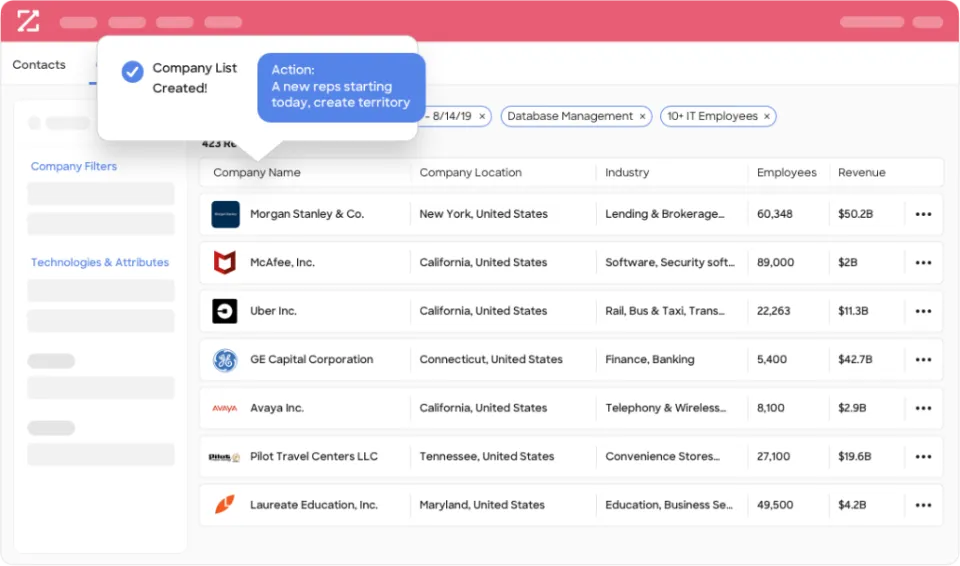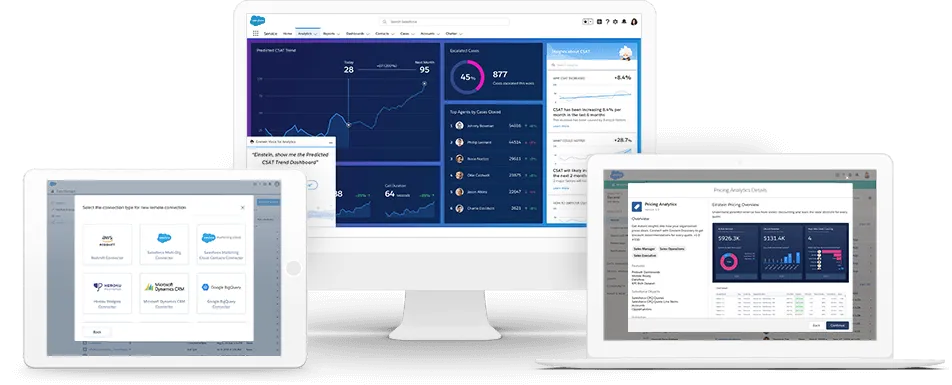What is Sales Operations?

Sales operations or sales ops teams is the part of a company that helps the sales team work better. It includes managing data, tools, and processes to make sales more efficient.
Importance of a Sales Operations Department
1.Supports the Sales Team
- Handles tasks like data analysis and managing sales tools.
- Allows salespeople to focus on selling.
Example: Sales teams with good support see a 20% increase in sales productivity alone.
2.Improves Sales Processes
- Analyzes how sales are made and finds ways to improve them.
- Includes creating better sales strategies or speeding up the sales process.
According to Harvard Business Review, companies with streamlined sales processes see a 30% higher win rate.
3.Uses Data for Forecasting
- Helps predict future sales using data.
- Accurate forecasting helps the company prepare and plan better.
4.Plans and Sets Goals
- Assists in planning and setting clear sales goals.
- Clear goals can lead to better performance.
Good planning and sales forecasting can lead to a 15% increase in sales, according to McKinsey & Company.
Key Roles in a Sales Operations Department

1. Sales Operations Manager
The Sales Operations Manager is a leader in the sales operations team. They make sure everything runs smoothly. Here’s what they do:
Oversees the Sales Operations Team
- They manage the team and make sure everyone knows their job.
- This helps the sales process work better.
Uses Data to Make Decisions
- They look at sales data to see what is working.
- This helps make smart decisions. According to a study, data-driven decisions can increase productivity by 20%.
Manages Sales Tools
- They make sure the sales team has the right tools.
- This includes Customer Relationship Management (CRM) systems. Using the right tools can improve efficiency by 25%.
Supports the Sales Team
- They handle administrative tasks so the sales team can focus on selling.
- This support can make the sales team more productive.
2. Sales Operations Analyst
The Sales Operations Analyst is another key role. They focus on the numbers and data. Here’s what they do:
Analyzes Sales Data
- They look at data to find patterns and trends.
- This helps understand what is working and what isn’t.
Forecasts Sales
- They predict future sales using data.
- Accurate forecasting helps the company plan better.
Improves Sales Processes
- They find ways to make the sales process better.
- This can include making the process faster or creating better strategies. Streamlined processes can lead to a 30% higher win rate.
Reports Findings
- They create reports to show what the data means.
- These reports help the Sales Operations Manager make decisions.
Supports the Sales Operations Team
- They provide data and analysis to help the team.
- This support helps the team work more efficiently.
3. Sales Operations Specialist
A Sales Operations Specialist helps the whole sales ops team by managing data and tools. Here’s what they do:
Manage Sales Tools
- They make sure the sales team has the right tools to do their job. This includes things like Customer Relationship Management (CRM) systems.
- Using the right tools can make the sales team more efficient.
Analyze Sales Data
- They look at data to see how the sales process is working. This helps them find ways to improve it.
- For example, they might find that a certain product is selling very well and suggest focusing more on that product.
Help with Training
- They make sure the sales team knows how to use the tools and follow the sales process.
- Proper training can increase the effectiveness of sales reps by 50%.
Create Reports
- They make reports that show how well the sales team is doing. These reports help the sales operations department make better decisions.
4. Senior Sales Operations Analyst
The Senior Sales Operations Analyst focuses on the numbers and data. Here’s what they do:
Deep Data Analysis
- They look at a lot of data to find trends and patterns. This helps the company understand what is working and what isn’t.
- Data-driven decisions can improve productivity by 20%.
Forecasts Sales
- They predict future sales using data analysis.
- Accurate sales forecasts help the company plan better.
Creates Reports
- They create reports to show what the sales data means.
- These reports help the sales operations manager make decisions.
Support Sales Operations Strategy
- They help plan and set sales goals. Clear goals lead to better performance.
- Good planning can increase sales by 15%, according to McKinsey & Company.
Uses Advanced Tools
- They use advanced tools and software for data analysis.
- This helps in getting more accurate insights.
Essential Skills Required for Sales Operations Teams

1. Analytical Skills
Analytical skills involve understanding and working with data.
Why it matters: Sales operations teams need to analyze data to see what is working and what isn't. This helps in making smart decisions.
How to showcase:
Data Analysis:
- Look at sales data to find trends.
- For example, find out which products are selling best.
- Data analysis can improve sales performance by 20%.
Reporting:
- Create reports to show how the sales team is doing.
- These reports help in planning and improving the sales process.
2. Technical Proficiency
Technical proficiency means being good at using sales tools and sales technology.
Why it matters: Sales operations teams use many tools to help the sales team. Knowing how to use these tools well is important.
How to showcase:
CRM Systems:
- Use Customer Relationship Management (CRM) systems to track sales and customer interactions.
- Proper use of CRM can improve efficiency by 25%.
Sales Tools:
- Manage and use various sales tools to support the sales process.
- This includes tools for data analysis, communication, and reporting.
Training:
- Train the sales team on how to use these tools.
- Proper training can increase sales effectiveness by 50%.
3. Process Optimization
Process optimization involves making the sales process better and the sales compensation more efficient.
Why it matters: A smooth sales process helps the sales team close deals faster and more effectively.
How to showcase:
Identifying Issues:
- Find out what parts of the sales process are slow or problematic.
- For example, if it takes too long to get customer information, find a way to speed it up.
Implementing Solutions:
- Make changes to improve these areas.
- According to Harvard Business Review, companies with optimized sales processes see a 30% higher win rate.
Continuous Improvement:
- Regularly check and improve the sales process.
- This ensures the sales team always works efficiently.
4. Strategic Thinking
Strategic thinking means planning for the future and making long-term decisions.
Why it matters: Sales operations teams need to think ahead to stay competitive and achieve sales goals.
How to showcase:
Setting Goals:
- Help set clear and achievable sales goals.
- Goals give the sales team direction and motivation.
Planning:
- Create plans to reach these goals.
- Good planning can lead to a 15% increase in sales, according to McKinsey & Company.
Adapting to Changes:
- Be ready to change plans if needed.
- This helps the team stay on track even when things don’t go as planned.
5. Problem-Solving
Problem-solving means finding solutions to challenges that come up.
Why it matters: Sales operations teams face many challenges, and solving these quickly is important.
How to showcase:
Identifying Problems:
- Spot problems early before they get bigger.
- For example, if a sales tool stops working, find out why and fix it quickly.
Finding Solutions:
- Come up with solutions that work well.
- Use creative thinking and teamwork to solve problems.
Implementing Solutions:
- Put the best solution into action.
- Monitor the results to make sure the problem is solved.
How To Structure a Sales Operations Department

1. Define Leadership Roles
Leadership roles set the direction for the sales operations team. Clear leadership ensures everyone knows their responsibilities. It helps the team work towards common goals.
How they do it:
Sales Operations Manager:
- Leads the sales operations department.
- Sets goals and plans strategies.
- Makes sure the sales team has what they need to succeed.
Senior Sales Operations Analyst:
- Works closely with the sales operations manager.
- Analyzes data to find trends and areas for improvement.
- Helps make informed decisions based on data.
2. Core Team Members
Core team members are the backbone of the sales operations department. They handle sales operations roles and specific tasks to support the sales team.
Sales Analysts:
Sales analysts look at sales data to help the team make smart decisions. Analyzing data helps understand what is working and what isn’t. It guides the team to focus on the right areas.
How they do it:
Data Analysis:
- Examine sales data to find trends.
- Create reports to show how the sales team is performing.
- Data analysis can improve sales performance by 20%.
CRM Specialists:
CRM specialists manage Customer Relationship Management (CRM) systems. CRM systems keep track of customer interactions and sales. Proper management of CRM helps the sales team stay organized.
How they do it:
CRM Management:
- Ensure the CRM system is up-to-date.
- Train the sales team on how to use the CRM.
- Good CRM management can improve efficiency by 25%.
Process Improvement Managers:
In process improvement, sales managers find ways to make the sales process better and faster. Improving processes helps the sales team close deals more efficiently. It leads to higher productivity.
How they do it:
Identify Issues:
- Look for parts of the sales process that are slow or problematic.
- For example, if it takes too long to get customer information, find a way to speed it up.
Implement Solutions:
- Make changes to improve these areas.
- Streamlined processes can lead to a 30% higher win rate, according to Harvard Business Review.
3. Support Roles
Support roles are crucial for the smooth operation of the sales operations department. They provide the necessary support to the core team.
Sales Enablement Specialists:
Sales enablement specialists provide tools and resources to the sales professionals to help the sales team succeed. They ensure the sales team has everything they need to perform their tasks effectively.
How they do it:
Training:
- Provide training sessions for the sales team.
- Ensure everyone knows how to use sales tools and follow the sales process.
Resources:
- Supply the sales team with the latest sales materials and information.
- Keep the sales team updated on best practices and new strategies.
Data Administrators:
Data administrators manage and organize sales data. Accurate data management is essential for making informed decisions.
How they do it:
Data Entry:
- Ensure all sales data is accurately entered into the system.
- Regularly update and maintain the sales database.
Data Quality:
- Check data for accuracy and completeness.
- Correct any errors and ensure data is reliable.
4. Establish Clear Processes and Workflows
Clear processes and workflows guide the sales operations team in their daily tasks. They ensure consistency and efficiency in the whole sales cycle process.
How:
Process Documentation:
- Document all sales processes clearly.
- Ensure everyone understands their roles and responsibilities.
Workflow Management:
- Create workflows for different sales tasks.
- Use tools to manage and track workflows.
5. Foster a Collaborative Culture
A collaborative culture encourages teamwork and communication. It helps the sales operations team work together effectively and solve problems quickly.
How:
Team Meetings:
- Hold regular team meetings to discuss progress and challenges.
- Encourage open communication and idea sharing.
Team Building Activities:
- Organize team-building activities to strengthen relationships.
- Foster a positive and supportive work environment.
Best Practices For Sales Operations Team

1. Establish Clear Goals and Metrics
Setting clear goals and metrics helps the sales operations team know what they need to achieve. Clear goals guide the successful sales ops team and keep everyone focused. Metrics help track progress and measure success.
Set Specific Goals
- Define what the team needs to accomplish.
- For example, aim to increase sales by 20% in the next quarter.
Use Key Metrics
- Track important metrics like sales growth, customer acquisition cost, and conversion rates.
- Regularly review these metrics to see how the team is performing.
2. Optimize Sales Processes
The sales process optimization means making the sales process more efficient and effective. A smooth sales process helps the sales team work better and close deals faster.
Analyze Current Processes
- Look at how the current sales process works.
- Identify any areas that are slow or problematic.
Implement Improvements
- Make changes to improve these areas.
- For example, streamline the process of getting customer information.
Use Technology:
- Use tools like CRM systems to automate tasks and keep track of customer interactions.
- This can improve efficiency by 25%.
3. Foster Effective Communication
Effective communication ensures everyone in the sales operations team is on the same page. Good communication helps the team work together and solve problems quickly.
Hold Regular Meetings:
- Have regular team meetings to discuss progress and challenges.
- Encourage everyone to share their ideas and feedback.
Use Communication Tools:
- Use tools like Slack or Microsoft Teams to stay connected.
- Make sure everyone has access to the information they need.
Encourage Open Communication:
- Create an environment where team members feel comfortable sharing their thoughts.
- This can lead to better ideas and solutions.
4. Provide Ongoing Training and Development
Ongoing training and development help the sales operations team stay updated and improve their skills. Continuous learning ensures the team can handle new challenges and use the latest tools effectively.
Regular Training Sessions:
- Schedule regular training for the team on new tools and processes.
- Make sure everyone knows how to use the tools properly.
Encourage Skill Development:
- Provide opportunities for team members to learn new skills.
- This can include online courses, workshops, or attending conferences.
Monitor Progress:
- Track the progress of team members' development.
- Give feedback and support to help them improve.
5. Implement a Feedback Loop
A feedback loop allows the sales operations team to learn from their experiences and make improvements. Regular feedback helps the sales ops team to identify what is working and what isn’t. It guides them to make necessary adjustments.
Collect Feedback:
- Encourage team members to share their thoughts on processes and tools.
- Use surveys or meetings to gather this feedback.
Analyze Feedback:
- Look at the feedback to find common issues or suggestions.
- Identify areas that need improvement.
Make Changes:
- Implement changes based on the feedback.
- Monitor the results to see if the changes are effective.
6. Ensure Data Accuracy and Integrity
Ensuring data accuracy and integrity means keeping the sales data correct and reliable. Accurate data is crucial for making informed decisions and tracking performance.
Regular Data Checks:
- Schedule regular checks to verify data accuracy.
- Correct any errors promptly.
Use Reliable Tools:
- Use dependable tools for data entry and management.
- Train team members to use these tools correctly.
Maintain Data Security:
- Protect data from unauthorized access or tampering.
- Use secure systems and follow best practices for data security.
Strategies for Sales Operations Team

1. Data-Driven Decision Making
Using data to make informed decisions. Data helps the the director of sales operations and team understand what is working and what isn’t. This leads to better strategies and improved performance.
- Collect Sales Data:
- Gather data from sales activities.
- Use tools like CRM systems to collect and store this data.
- Analyze Data:
- Look at the data to find trends and patterns.
- For example, identify which products are selling the best.
- Make Decisions Based on Data:
- Use the insights from data analysis to guide decisions.
- For example, focus on strategies that improve high-performing products.
2. Enhance CRM Utilization
Using Customer Relationship Management (CRM) systems effectively. A CRM system helps track customer interactions and manage sales processes. Proper use of CRM can improve efficiency and sales performance.
- Train the Sales Team:
- Provide training on how to use the CRM system.
- Make sure everyone knows how to enter and update customer information.
- Maintain Accurate Data:
- Regularly update and clean the data in the CRM.
- Ensure all customer interactions are recorded accurately.
- Use CRM Tools:
- Utilize CRM features like automated follow-ups and reporting.
- This helps the sales team stay organized and focused.
3. Implement Effective Sales Enablement
Providing the sales enablement teams with the resources they need to sell effectively. Sales enablement helps the sales team be more productive and successful.
- Provide Training and Resources:
- Offer regular training sessions on new products and sales techniques.
- Provide materials like brochures, case studies, and presentations.
- Use Sales Tools:
- Equip the sales team with tools that help them work better.
- For example, use email tracking tools to see when customers open emails.
- Measure Sales Enablement Impact:
- Track how sales enablement efforts are affecting sales performance.
- Adjust strategies based on what is working best.
4. Focus on Customer Experience
Ensuring a positive customer experience throughout the sales process. Happy customers are more likely to buy again and recommend the company to others. A good customer experience can increase sales and loyalty.
- Understand Customer Needs:
- Listen to what customers want and need.
- Use surveys and feedback to gather this information.
- Provide Excellent Service:
- Train the sales team to be helpful and responsive.
- Make sure customers get the support they need quickly.
- Follow Up:
- Keep in touch with customers after a sale.
- Check if they are satisfied and address any issues.
5. Monitor Market Trends and Competitor Activity
Keeping an eye on changes in the market and what competitors are doing. Staying aware of market trends and competitors helps the whole sales strategy and operations team adapt and stay competitive.
- Research Market Trends:
- Regularly review industry reports and news.
- Identify trends that could impact the business.
- Analyze Competitors:
- Look at what competitors are doing well.
- Learn from their successes and mistakes.
- Adjust Strategies:
- Use this information to refine sales strategies.
- Stay ahead of market changes and competitor moves.
6. Implement Key Performance Indicators (KPIs)
Using KPIs to measure and track the performance of the sales operations team. KPIs help the team understand how well they are doing and where they can improve. They provide clear targets and motivation.
- Choose Relevant KPIs:
- Select KPIs that reflect important aspects of the sales process.
- Examples include sales growth, customer acquisition cost, and conversion rates.
- Monitor KPIs Regularly:
- Track KPIs over time to see progress.
- Use tools like dashboards to make this easy.
- Make Data-Driven Adjustments:
- Use KPI data to make informed decisions.
- Adjust strategies based on what the KPIs show.
Sales Operations Tools and Technologies
1. Sales Analytics and Reporting Tools
These tools help analyze sales data and create reports. They provide insights into sales performance and help identify areas for improvement
Tableau:

- Tableau helps visualize sales data with charts and graphs.
- It makes it easy to understand trends and patterns in sales.
- Tableau can combine data from different sources for a complete view.
Power BI:

- Power BI is a tool for creating interactive reports.
- It helps track key metrics and monitor sales performance.
- Power BI integrates well with other Microsoft tools like Excel.
2. Lead Generation and Prospecting Tools
These tools help find potential customers and generate leads. They make it easier for the sales team to identify and reach out to new prospects.
LinkedIn Sales Navigator:

- LinkedIn Sales Navigator helps find and connect with potential customers on LinkedIn.
- It provides advanced search filters to target the right prospects.
- Sales Navigator also offers insights into prospects’ activities and interests.
ZoomInfo:

- ZoomInfo provides a database of business contacts and companies.
- It helps sales teams find accurate contact information for leads.
- ZoomInfo can also track company news and updates for better prospecting.
3. Performance Management Tools
These tools help track and manage the performance of the whole sales and operations team. They ensure the team meets its goals and stays motivated.
Ambition:

- Ambition helps monitor sales performance and set goals.
- It provides real-time dashboards to track progress.
- Ambition also offers gamification features to keep the team motivated.
Salesforce Einstein Analytics:

- Einstein Analytics is a part of Salesforce.
- It uses AI to analyze sales data and provide insights.
- Einstein Analytics helps predict future sales and identify growth opportunities.
Conclusion
A strong sales operations department is vital for a company’s success. Using the right tools and strategies helps the sales operations team work better.
By following these best practices, the sales organization and operations team can support the sales process effectively. This helps the company grow and succeed in the market.





.jpg)

.jpg)
